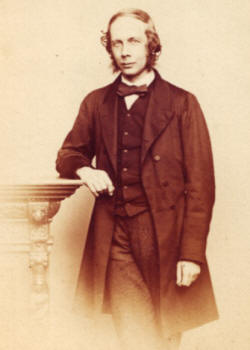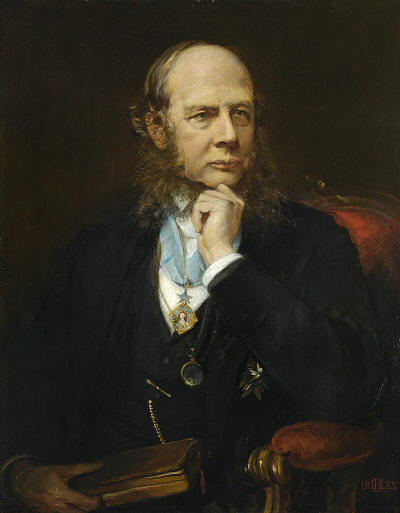

Queer Places:
University of Cambridge, 4 Mill Ln, Cambridge CB2 1RZ
University of Oxford, Oxford, Oxfordshire OX1 3PA
Westminster Abbey
Westminster, City of Westminster, Greater London, England
Cimetière du Grand Jas de Cannes
Cannes, Departement des Alpes-Maritimes, Provence-Alpes-Côte d'Azur, France
 Sir Henry James Sumner Maine KCSI (15 August 1822 – 3 February 1888), was a British Whig[1] comparative jurist[2] and historian.[3]
He was a Cambridge Apostle. He is famous for the thesis outlined in his book Ancient Law that law and society developed "from status to contract."[4] According to the thesis, in the ancient world individuals were tightly bound by status to traditional groups, while in the modern one, in which individuals are viewed as autonomous agents, they are free to make contracts and form associations with whomever they choose. Because of this thesis, Maine can be seen as one of the forefathers of modern legal anthropology, legal history and sociology of law. Maine wrote journalism in 1851 for the Morning Chronicle, edited by John Douglas Cook. With Cook and others, in 1855, he then founded and edited the Saturday Review, writing for it to 1861.[12] Like his close friend
James Fitzjames Stephen, he enjoyed occasional article-writing, and never quite abandoned it.
Sir Henry James Sumner Maine KCSI (15 August 1822 – 3 February 1888), was a British Whig[1] comparative jurist[2] and historian.[3]
He was a Cambridge Apostle. He is famous for the thesis outlined in his book Ancient Law that law and society developed "from status to contract."[4] According to the thesis, in the ancient world individuals were tightly bound by status to traditional groups, while in the modern one, in which individuals are viewed as autonomous agents, they are free to make contracts and form associations with whomever they choose. Because of this thesis, Maine can be seen as one of the forefathers of modern legal anthropology, legal history and sociology of law. Maine wrote journalism in 1851 for the Morning Chronicle, edited by John Douglas Cook. With Cook and others, in 1855, he then founded and edited the Saturday Review, writing for it to 1861.[12] Like his close friend
James Fitzjames Stephen, he enjoyed occasional article-writing, and never quite abandoned it.
Maine was the son of Dr. James Maine, of Kelso, Roxburghshire. He was educated at Christ's Hospital, where a boarding house was named after him in 1902. From there he went up to Pembroke College, Cambridge, in 1840. At Cambridge, he was noted as a classical scholar and also won the Chancellor's Gold Medal for poetry in 1842.[5] He won a Craven scholarship and graduated as senior classic in 1844, being also senior chancellor's medallist in classics.[6] Shortly afterwards, he accepted a tutorship at Trinity Hall. In 1847, he was appointed Regius Professor of Civil Law,[7] and he was called to the bar three years later; he held this chair till 1854. Meanwhile, in 1852 he had become one of the readers appointed by the Inns of Court.
The post of legal member of council in India was offered to Maine in 1861; he declined it once, on grounds of health. The following year Maine was persuaded to accept, and it turned out that India suited him much better than Cambridge or London. He was asked to prolong his services beyond the regular term of five years, and he returned to England in 1869. The subjects on which it was Maine's duty to advise the government of India were as much political as legal. They ranged from such problems as the land settlement of the Punjab, or the introduction of civil marriage to provide for the needs of unorthodox Hindus, to the question of how far the study of Persian should be required or encouraged among European civil servants. Plans of codification were prepared, and largely shaped, under Maine's direction, which were implemented by his successors, Sir James Fitzjames Stephen and Dr Whitley Stokes. Maine became a member of the secretary of state's council in 1871 and remained so for the rest of his life. In the same year he was gazetted a K.C.S.I.[8]

Sir Henry James Sumner Maine, by Lowes Cato Dickinson, 1888.
In 1869, Maine was appointed to the chair of historical and comparative jurisprudence newly founded in the University of Oxford by Corpus Christi College.[9] Residence at Oxford was not required, and the election amounted to an invitation to the new professor to resume and continue in his own way the work he had begun in Ancient Law. In 1877, the mastership of Trinity Hall, Cambridge, where Maine had formerly been tutor, became vacant. There were two strong candidates whose claims were so nearly equal that it was difficult to elect either; the difficulty was solved by a unanimous invitation to Maine to accept the post. His acceptance entailed the resignation of the Oxford chair, though not continuous residence at Cambridge. Ten years later, he was elected to succeed Sir William Harcourt as Whewell Professor of International Law at Cambridge. In 1886, he was elected as a member to the American Philosophical Society.[10]
Maine's health, which had never been strong, gave way towards the end of 1887. He went to the Riviera under medical advice, and died at Cannes, France, on 3 February 1888. He left a wife, Jane, and two sons, of whom the elder died soon afterwards. An oil portrait of Jane remains in the possession of their descendants.[11]
My published books: